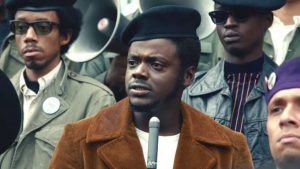As the name implies, “Judas and the Black Messiah” is a story of betrayal.
The betrayer is William O’Neal, who is picked up by police early in the movie for stealing a car while pretending to be an FBI agent. Pretty soon a real FBI agent, Roy Mitchell, offers O’Neal a choice — either do 6+ years in prison or become an informant, infiltrating the local branch of the Black Panthers, led by Fred Hampton. Desperate to stay out of jail, O’Neal agrees, and is soon working his way into the Panthers organization and close to the man known as The Chairman.
Only 21, Hampton was the charismatic leader of the Illinois Chapter of the Black Panther Party, and thus considered a radical threat by J. Edgar Hoover’s FBI. Under his leadership, the Black Panthers partnered with other groups and street gangs in a multiracial Rainbow Coalition, feeding poor people and operating free medical clinics while also fomenting an armed revolution against the police and the society of oppression.
“Judas and the Black Messiah” works so well because of such strong performances by every member of its cast. Daniel Kaluuya (who was so impressive in “Get Out,” “Black Panther,” and “Queen and Slim”) is mesmerizing as Hampton. He is matched beat for beat by LaKeith Stanfield (also from “Get Out,” as well as “Short Term 12” and “Knives Out”) as O’Neal, a tortured soul who starts buying into Hampton’s message, but is caught in an FBI trap from which he can’t escape.
Director/writer Shaka King captures the look and feel of late 1960s Chicago very nicely, and gives Kaluuya plenty of room to replicate Hampton’s oratorical skills, but also present him as a thinker of big ideas. He’s not satisfied with renaming schools after Black figures or replicating African culture. He sees the plight of Black Americans as being in a house that’s on fire, where the only priorities are water and escape.
But the film isn’t just about one man’s activism. King provides context by surrounding Hampton with other powerful characters, including a love story with Deborah Johnson (Dominique Fishback from HBO’s “The Deuce”) as the woman who bore Hampton’s son. Both she and Fred Jr. followed in his footsteps, remaining political activists and serving as technical advisors on “Judas and the Black Messiah.” There’s also superlative work from a large supporting cast that includes Jesse Plemons as FBI agent Mitchell and Martin Sheen as Hoover.
It’s fascinating to watch “Judas and the Black Messiah” at a time when racism and politics are once again on the front burner in the US. While the tone of Black Lives Matter protests aren’t nearly as harsh as the revolutionary messages of Hampton and the Black Panthers, there’s certainly a through-line from that era to this one, particularly in interactions with police.
There’s also an echo from the messages of insurrection being spewed today by white supremacists and others, such as those who attacked the Capitol on January 6th. The difference is that the latter groups aren’t oppressed, despite the lies they’ve been told by the former president, right-wing media, and their social media bubbles. Yet in listening to Hampton’s public addresses, you can hear what it took then — and now — to rile up a crowd and convince people that domestic extremism is the only answer.
“Judas and the Black Messiah” also makes an interesting companion to Aaron Sorkin’s “The Trial of the Chicago 7” (the scene where Black Panther founder Bobby Seale was mistreated by a racist judge — at the same time in the same city) and Regina King’s “One Night In Miami” (about Malcolm X, Muhammad Ali, Sam Cooke, and Jim Brown). The connective tissue of all three movies is young Black men trying to fight for freedom in a world dominated by white authority figures who fear and thus persecute them.
Historical dramas must all have a coda that tells the audience what happened to the characters after the final scene, and “Judas and the Black Messiah” delivers. There are not just on-screen notes, but also footage of the real Fred Hampton speaking to a crowd of followers and William O’Neal being interviewed years later for a documentary about the incidents portrayed.
“Judas and the Black Messiah” is a riveting movie based on real events. I give it a 9 out of 10.
It’s in theaters now, and streaming on HBO Max until March 15th.

